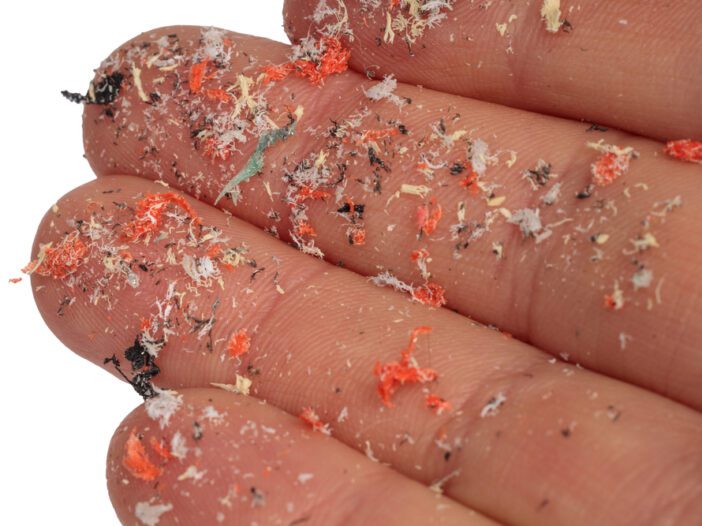
Fertility specialists have long suspected that plastic products pose a threat to infertility. However, this research has circulated chiefly in the realm of endocrinology (study of hormone-related diseases and disorders) and healthcare – and less in the public arena. Studies related to environmental toxins, like plastic, have shown that certain chemicals found in most plastic products – called endocrine-disrupting chemicals (ECDs) affect hormone balance and increase the chance of infertility in women and men.
Now, further studies prove that microplastics (small plastic pieces less than five millimeters that shear off plastic products and are ingested) have been found throughout the body. They leach harmful chemicals into the body, and their impact is serious – including strong links between microplastics found in the testicles and low sperm count.
Microplastics Lower Sperm Counts & Threaten Fertility
Microplastics are found just about everywhere, from lakes, streams, and soil samples to just about anywhere in the human body. The more plastics you have in your world (water bottles, toys, foot containers, wrappers, shopping bags, etc.), the more likely you are to have higher levels of microplastic in your system. For men, this may impact sperm health and fertility.
Multiple recent research from different countries, some using human subjects and others using animals, have found microplastic in testicles. While researchers have long associated exposure to microplastics and lower fertility rates, this new finding is somewhat of a surprise because the testicles are known for having a tight, strong, protective membrane barrier around them.
How do microplastics get into the testicles?
While studies will continue to uncover more about the relationship between microplastics, male sperm count, and general male/female infertility, researchers suspect it’s the hard, shard-like nature of microplastic particles that allow them to pierce and penetrate cells. And, since cells rely on a delicate balance, even the smallest foreign particles can significantly affect cell health and behavior.
The most common plastics found in the testicles of both humans and dogs were PVC and polyethylene – both of which are considered ubiquitous because they’re used in so many products.
- PVC (polyvinyl chloride). PVC is a very strong thermoplastic material used in almost all plumbing and irrigation pipes, and to insulate electrical wires and cables. However, if you refer to something as “vinyl,” it probably contains PVC. The Green Peace organization calls PVC “The Poison Plastic” because “The PVC lifecycle — its production, use, and disposal — results in the release of toxic, chlorine-based chemicals. These toxins are building up in the water, air and food chain…The result: severe health problems, including cancer, immune system damage, and hormone disruption.”
- Polyethylene. Like PVC, polyethylene is also a thermoplastic material, but it’s considered a “commodity plastic” because it’s inexpensive to produce, flexible, an insulator, and can be transparent. Polyethylene is in virtually every type of plastic we use on a daily basis, including milk containers, toys, buckets, cereal boxes, and other snack box liners, etc.
Optimizing your health & fertility in a plastic world
You can do plenty of things to reduce your personal, contact-based exposure to plastics – especially the ingestible kind that are most likely to lodge in the body.
1. Avoid plastic water and drink bottles
There’s not much more we can say here. They’re a significant cause of endocrine-disrupting chemicals (EDCs) and microplastics.
2. Minimize plastic packaging
You may have to change brands and get used to different flavors, but whenever you can choose food products in glass jars, cardboard, or paper packaging, prioritize that.
3. Consider installing a whole-home (or tap water) filtration system
Houses built in the 70s to the present have polyethylene or PVC plumbing. This means you drink, cook, and wash with microplastics. You can reduce microplastic in your water supply by investing in a high-quality tap- or whole-home filtration system. However, most general filtration systems do not filter microplastics, so read the fine print carefully when it comes to what prospective systems do and don’t filter.
4. Shop at farmer’s markets, co-ops, and bulk food suppliers.
The more you shop at local farmer’s markets, local farms, co-ops, and stores that carry bulk foods, the more you can use your own glass, metal, or paper containers. This greatly reduces foods stored in plastic and, as an added benefit, you’ll start to focus more on healthy, whole foods over processed, packaged versions.
5. Transition to eco-friendly cleaning, health, and beauty products
Because we know EDCs threaten fertility, we recommend taking a step-by-step approach to living a fertility-friendly lifestyle. Every little bit helps!
RRC Is Here to Support Your Fertility Choices
The Reproductive Resource Center team is here to provide the information you need to make fertility-supportive choices. Contact us to learn more about our services or to schedule a consultation to get an accurate diagnosis and personalized fertility plan – including lifestyle tips to optimize your fertility chances.
 Patient Portal
Patient Portal